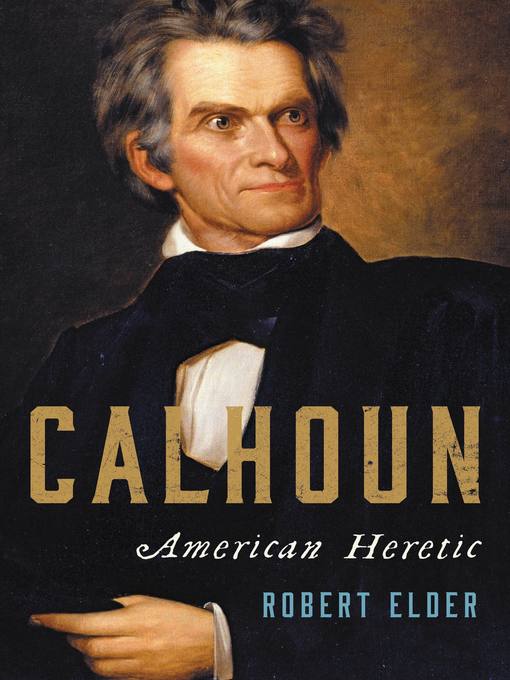
Calhoun
American Heretic
- اطلاعات
- نقد و بررسی
- دیدگاه کاربران
نقد و بررسی

December 1, 2020
The Southern politician and proto-secessionist comes in for a fresh appraisal. Elder, a professor of history at Baylor, observes that the recent rise of conservative opposition to civil rights owes to the example of John C. Calhoun (1782-1850), a South Carolinian honored in his time for his analytical approach to problems of government. However, Calhoun also held the view that Thomas Jefferson and the Enlightenment philosophers who guided early American thought were wrong: All men are not created equal, and "freedom was not man's natural state." Instead, well before the Civil War, which his thought helped precipitate, Calhoun argued that the government of the U.S. was "the government of the white man" and that Southern expansion into places such as Texas meant that slavery should naturally be extended westward. Elder has an eye for nuance and ironic juxtaposition. Some of the slaveholders whom Calhoun championed feared that absorbing Texas into the U.S. "would devalue the worn-out land in older cotton-producing states." Furthermore, Calhoun urged alliances with other slaveholding entities to thwart British expansion into the hemisphere, which would entail emancipation, then a policy of the crown. He also urged ending the trans-Atlantic slave trade in favor of "naturally reproducing enslaved populations." Conflict with Northern abolitionists was the natural result, with Calhoun ever more clearly the intellectual leader of the emerging Southern cause. In one of his writings, Calhoun concocted a remedy for the growing rift between the industrial North and the agrarian South: He proposed "to amend the Constitution to institute a dual executive, one from each section, with each having a veto over any Congressional legislation." If that proposal had been realized, slavery would likely still exist in some form in the U.S. Of course, as the author notes, "even today...there are numerous secession movements" that draw inspiration from him--good enough reason to pull his statue down, as Charleston did recently. A forcefully argued case for placing Calhoun at the center of any honest account of America's tangled past.
COPYRIGHT(2020) Kirkus Reviews, ALL RIGHTS RESERVED.

January 4, 2021
Historian Elder (The Sacred Mirror) reassesses the life and legacy of U.S. vice president and South Carolina senator John C. Calhoun (1782–1850) in this comprehensive biography. Elder skillfully tracks Calhoun’s unusual political career trajectory, from his advocacy for war with England as a freshman congressman in 1811, to his modernization of the U.S. Army as secretary of war, resignation as Andrew Jackson’s vice president and return to Congress in 1832 as a strident advocate for states’ rights, and calls for a constitutional amendment protecting slavery in the weeks before his death in 1850. Elder scrutinizes Calhoun’s creative interpretations of the U.S. Constitution and forthrightly documents his deep-rooted belief in white supremacy, but understates his political failings, including his knack for turning allies into enemies and the single-mindedness that doomed his presidential ambitions and contributed to his brief and ineffectual tenure as secretary of state in 1844–1845. Still, Elder is a graceful writer who persuasively argues that the beliefs and policies Calhoun amplified continue to shape American politics. Readers with a keen interest in the pre–Civil War era and a strong stomach for objectionable viewpoints will gain insight from this expert account.

Starred review from February 1, 2021
Elder's (history, Baylor Univ.) cultural and intellectual biography expertly recounts the life and times of John C. Calhoun (1782-1850), a political force from the 1810s through the 1840s. Although his presidential ambitions were unsuccessful, he represented South Carolina in the U.S. House and Senate. He served as James Monroe's Secretary of War and was Vice President to John Quincy Adams and Andrew Jackson, though he became political foes of both men. He was also, briefly, John Tyler's Secretary of State. But Calhoun is best remembered as one of the architects of Southern secession and a fervent defender of slavery as property, which he considered "one of the most essential rights of white citizens." In addition to detailing Calhoun's substantial career, Elder delves into his subject's political philosophy and influences. Elder gives ample space to Calhoun's personal life, including his marriage, children, illnesses, and constant financial struggles. He also assesses the politician's controversial legacy and the dismantling of his reputation. In a powerfully written epilogue, he states, "We do not have to honor John C. Calhoun, nor should we. But he has not left us the luxury of forgetting him." VERDICT This well-researched book offers a definitive account of Calhoun, and will appeal to anyone interested in early American history.--Thomas Karel, Franklin & Marshall Coll. Lib., Lancaster, PA
Copyright 2021 Library Journal, LLC Used with permission.




دیدگاه کاربران